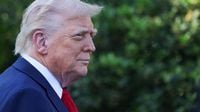WASHINGTON (AP) — The White House opened a weeklong celebration of Donald Trump’s first 100 days in office on Monday, April 28, 2025, with a focus on his controversial border crackdown, a key area of strength amid troubling polling indicators. Yard signs displaying mugshots of immigrants accused of serious crimes, including rape and murder, were strategically placed across the White House lawn, ensuring they would be visible in television broadcasts from outside the West Wing.
Tom Homan, Trump’s top border adviser, declared to reporters that there has been "unprecedented success" regarding the administration's border efforts, stating, "we’re going to keep doing it, full speed ahead." White House press secretary Karoline Leavitt emphasized that the administration is in "the beginning stages of carrying out the largest deportation campaign in American history." Currently, approximately 139,000 individuals have been removed from the country, according to White House statistics.
On Tuesday, April 29, 2025, Trump plans to mark his 100th day in office with a rally in Macomb County, Michigan, an automotive hub located north of Detroit. Additionally, he is scheduled to deliver a commencement address at the University of Alabama on Thursday, May 1, 2025. As part of the celebrations, Trump signed two executive orders concerning immigration on Monday, including one that directs state and federal officials to publish a list of "sanctuary city" jurisdictions.
Despite these efforts, an AP-NORC survey indicates a significant portion of the American public feels that Trump has been focusing on the wrong priorities. Nearly twice as many respondents believe he is not addressing the right issues, with only about half of Republicans affirming that he has been focusing on the appropriate matters. Furthermore, the share of Republicans who consider Trump to be at least a "good" president has dropped by approximately 10 percentage points since January.
Polling conducted in recent weeks has revealed widespread dissatisfaction regarding Trump’s first few months in office, particularly concerning his economic policies and tariff strategies. Trump responded to these unfavorable poll results on social media, dismissing them as "FAKE POLLS FROM FAKE NEWS ORGANIZATIONS." While he has pushed for a crackdown on illegal immigration, he has faced criticism for straining the limits of executive power. This includes actions such as sending hundreds of alleged Venezuelan gang members to a mega-prison in El Salvador against a court order and resisting a Supreme Court directive to facilitate the return of Kilmar Abrego Garcia, who was mistakenly deported.
As the White House ramps up efforts to encourage those in the country illegally to "self-deport," measures include imposing stiffer fines and offering incentives like airfare and stipends. The administration points to a notable decline in illegal border crossings as an early indicator of success. However, concerns remain regarding the broader implications of these policies.
Trump's second term is already being described as troubled, with analysts warning that his ambitious agenda could lead to significant economic and foreign policy challenges. His administration has made strides in expanding U.S. energy production, a welcome development following the previous administration's restrictions on fossil fuels. Additionally, Trump has claimed to have effectively ended the border crisis. However, many of his other initiatives have not matched the high expectations he set during his campaign.
Critics argue that Trump's aggressive tariff policies could severely damage his presidency. The tariffs represent the largest economic policy shock since Richard Nixon's era, which led to rampant inflation and economic turmoil. Tariffs are expected to result in increased prices for consumers and shortages for businesses reliant on imported goods. Ken Griffin, a prominent investor and major donor to Trump, recently described the situation as a self-inflicted wound to the American brand, suggesting that the U.S. is ceding its global economic leadership.
In light of these challenges, Trump has begun discussing the potential for around 200 trade deals and has hinted at the possibility of unilaterally cutting his 145% tariff on Chinese imports. However, achieving these trade agreements may prove difficult and time-consuming.
Trump's foreign policy initiatives have also come under scrutiny. His administration is attempting to reclaim Middle Eastern sea lanes from the Houthis, a move intended to counter the perceived timidity of the previous administration. Furthermore, Trump is re-establishing a "maximum pressure" campaign on Iran to compel it to abandon its nuclear ambitions.
However, his approach to the ongoing conflict in Ukraine has raised alarms. Trump has been criticized for not holding Vladimir Putin accountable and for pressuring Ukraine to make concessions that could jeopardize its sovereignty. Observers warn that a failure to navigate this situation effectively could have dire consequences for U.S. deterrence globally, particularly concerning Iran, North Korea, and China.
Despite the challenges he faces, Trump continues to push his agenda, focusing on issues like immigration and energy production. However, many Americans are left wondering whether his administration's priorities align with their concerns. As he moves forward into the next phase of his presidency, the question remains: can Trump pivot effectively to address the mounting criticisms and restore confidence among voters?




